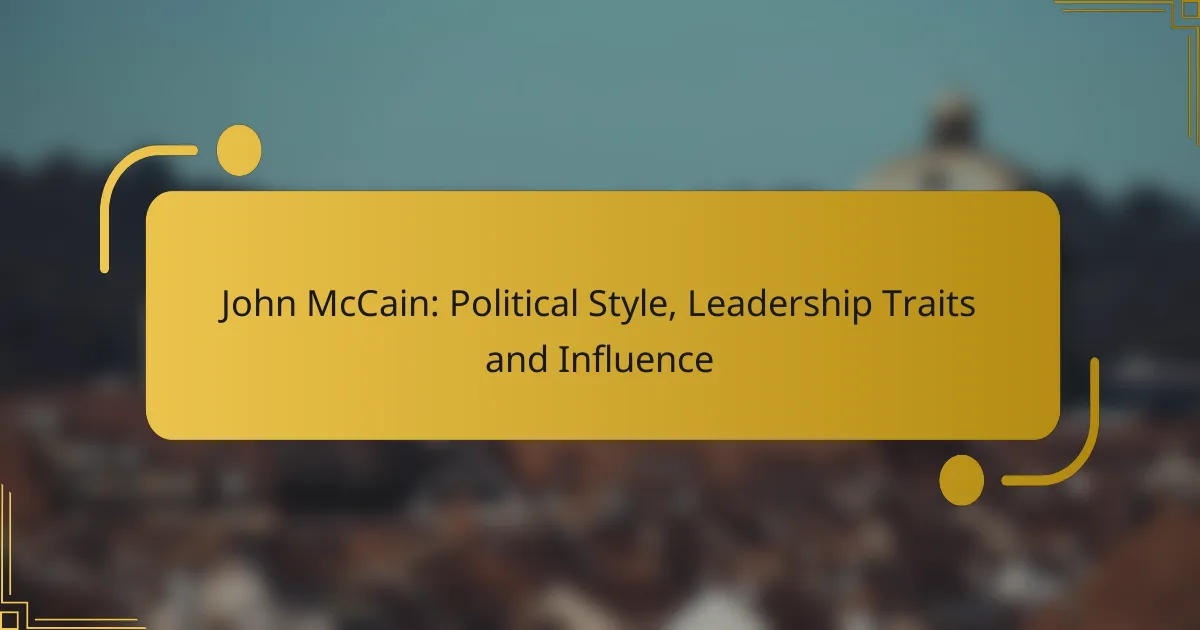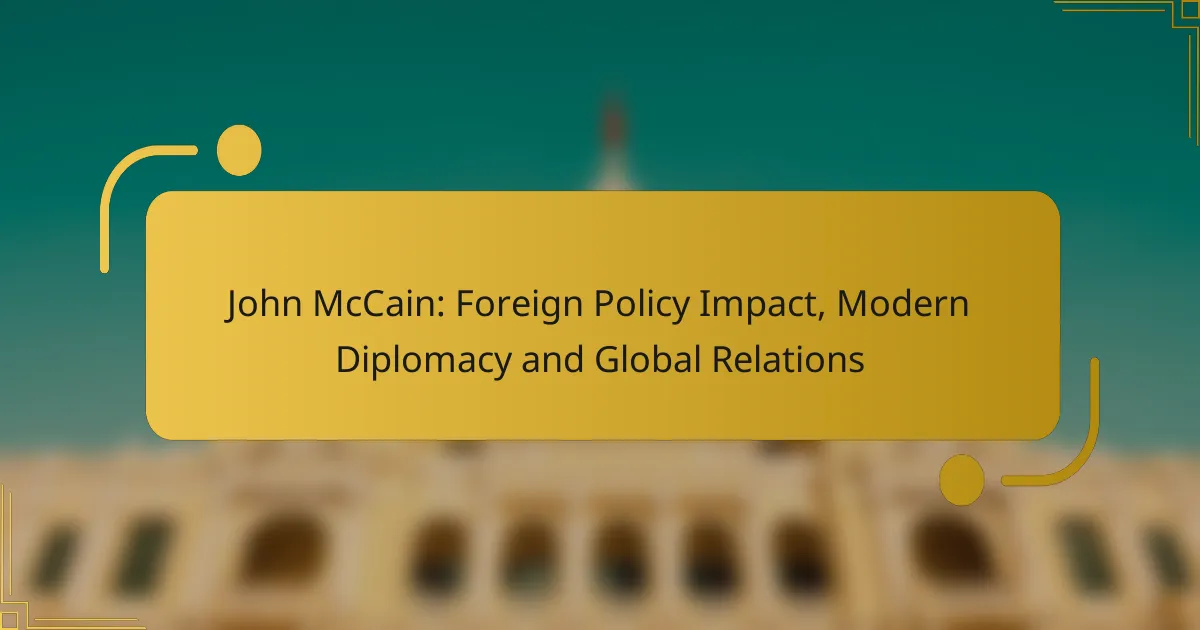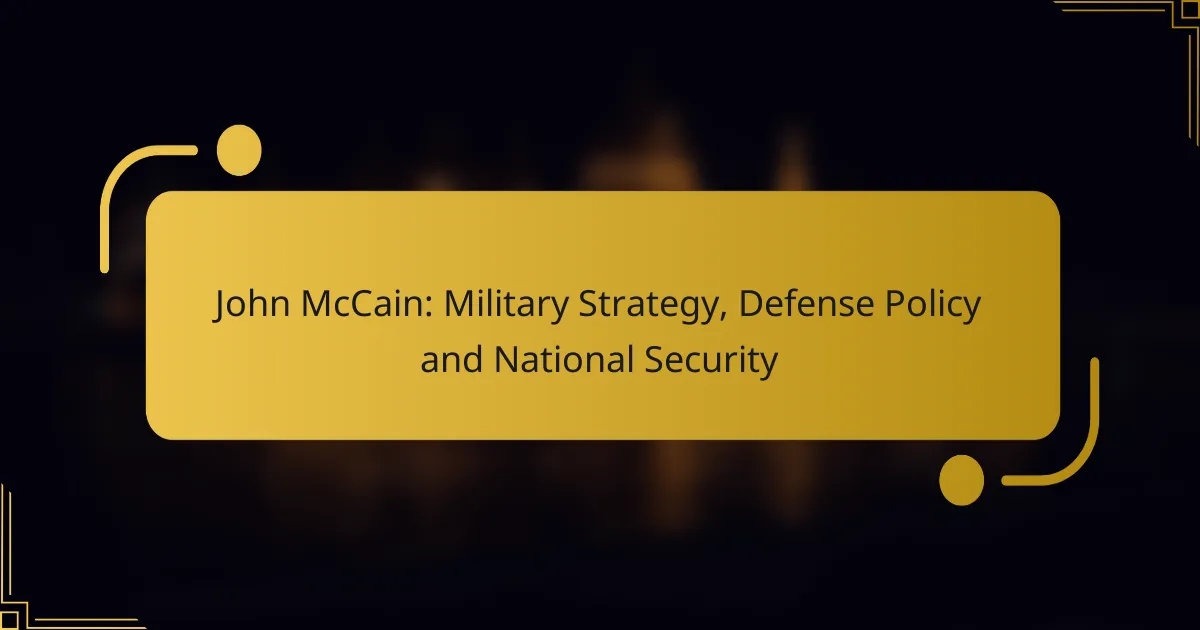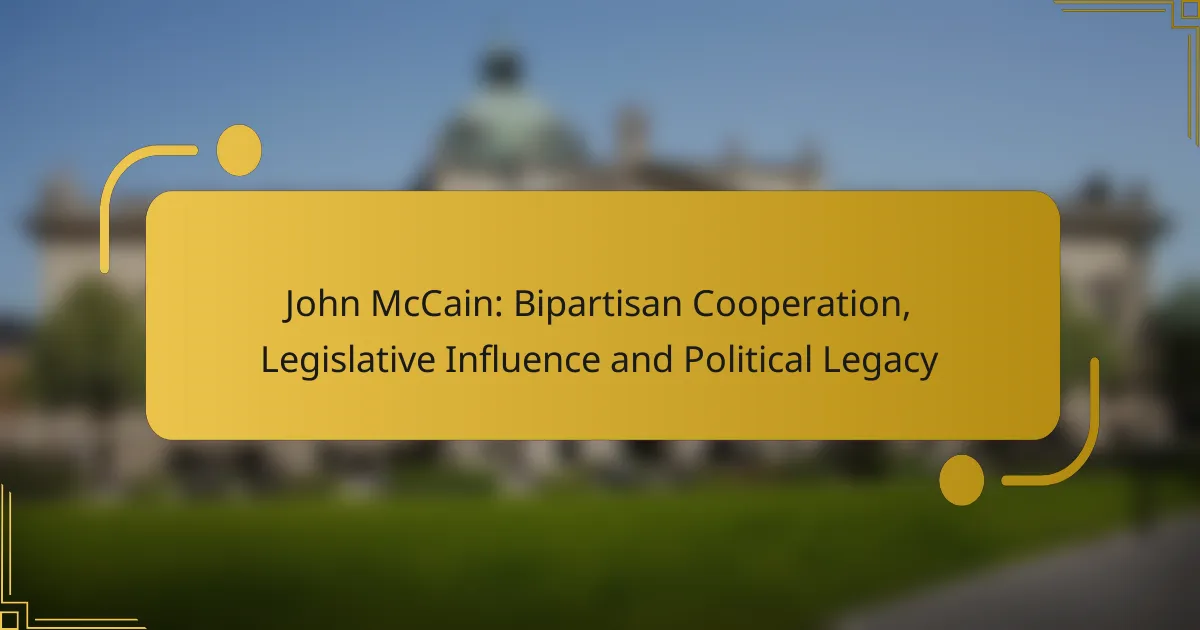John McCain was a prominent figure in American politics, known for his integrity, resilience, and commitment to bipartisanship. His political style combined principled conservatism with independent thinking, allowing him to engage actively with constituents and challenge party lines. Through his leadership traits and advocacy for key issues, McCain left a lasting influence on governance and inspired future generations of politicians.

What are John McCain’s key leadership traits?
John McCain’s key leadership traits include integrity, resilience, a commitment to bipartisanship, strong communication skills, and strategic decision-making. These qualities shaped his political career and influenced his approach to governance and public service.
Integrity and honesty
Integrity and honesty were cornerstones of John McCain’s leadership style. He consistently emphasized the importance of truthfulness in politics, which earned him respect across party lines. His willingness to admit mistakes and stand by his principles, even when unpopular, set a standard for ethical conduct in public service.
For instance, McCain often spoke out against corruption and advocated for campaign finance reform, demonstrating his commitment to transparency. This integrity helped him build trust with constituents and colleagues alike.
Resilience in adversity
John McCain’s resilience in adversity was evident throughout his life, particularly during his time as a prisoner of war. He endured significant hardship but emerged with a strong sense of purpose and determination. This resilience translated into his political career, where he faced numerous challenges yet remained steadfast in his beliefs.
His ability to bounce back from setbacks inspired many and served as a reminder that perseverance is crucial in leadership. McCain’s experiences taught him the value of maintaining focus and composure, even in the face of significant obstacles.
Commitment to bipartisanship
McCain was known for his commitment to bipartisanship, often seeking common ground with political opponents. He believed that effective governance required collaboration and dialogue, which he practiced throughout his career. This approach allowed him to work on significant legislation, such as immigration reform and healthcare initiatives.
By prioritizing cooperation over partisanship, McCain demonstrated that progress is possible when leaders are willing to engage across the aisle. His legacy includes a call for unity in a polarized political landscape.
Strong communication skills
Strong communication skills were a hallmark of McCain’s leadership. He had a unique ability to articulate complex issues clearly and persuasively, making him an effective advocate for his causes. His speeches often resonated with audiences, blending personal anecdotes with broader themes of patriotism and service.
McCain’s communication style was direct and candid, which helped him connect with people from various backgrounds. This skill was vital in rallying support for his initiatives and building coalitions.
Strategic decision-making
Strategic decision-making defined McCain’s approach to leadership, as he often weighed the implications of his choices carefully. He was known for his ability to analyze situations from multiple perspectives, considering both short-term and long-term consequences. This strategic mindset enabled him to navigate complex political landscapes effectively.
For example, McCain’s decisions regarding military interventions were often grounded in a thorough understanding of geopolitical dynamics. His focus on strategy helped him advocate for policies that aligned with his vision for national security and foreign relations.

How did John McCain influence American politics?
John McCain significantly influenced American politics through his bipartisan approach, commitment to national security, and advocacy for campaign finance reform. His leadership traits and willingness to challenge party lines shaped key policies and inspired future generations of politicians.
Impact on foreign policy
John McCain’s influence on foreign policy was marked by his strong advocacy for a robust military presence and international engagement. He believed in the importance of American leadership on the global stage, often supporting interventions in conflicts where he felt U.S. interests were at stake.
His stance on issues like the Iraq War and relations with countries such as Russia and North Korea showcased his belief in promoting democracy and human rights abroad. McCain’s perspective often emphasized the need for a proactive rather than reactive foreign policy.
Role in campaign finance reform
McCain played a pivotal role in campaign finance reform, notably through the Bipartisan Campaign Reform Act of 2002, also known as the McCain-Feingold Act. This legislation aimed to reduce the influence of money in politics by limiting soft money contributions to political parties.
His efforts sparked ongoing debates about the balance between free speech and the need for transparency in campaign financing. McCain’s commitment to reform highlighted the challenges of ensuring fair electoral processes in the face of substantial financial contributions.
Advocacy for veterans’ rights
As a veteran himself, John McCain was a staunch advocate for veterans’ rights, focusing on improving healthcare, benefits, and support services for those who served in the military. He worked tirelessly to address issues such as the backlog in veterans’ claims and the quality of care provided by the Department of Veterans Affairs.
McCain’s dedication to veterans was evident in his legislative efforts, including the Veterans Access, Choice, and Accountability Act of 2014, which aimed to expand healthcare options for veterans. His advocacy set a standard for prioritizing the needs of service members and their families in American politics.

What was John McCain’s political style?
John McCain’s political style was characterized by a blend of principled conservatism, independent thinking, and active engagement with constituents. His approach emphasized integrity, bipartisanship, and a commitment to public service, which resonated with many Americans throughout his career.
Principled conservatism
McCain’s principled conservatism was rooted in traditional Republican values, including a strong national defense, fiscal responsibility, and limited government. He often advocated for policies that aligned with these principles, such as tax cuts and military funding, while also emphasizing the importance of ethical governance.
He was known for his willingness to challenge his party on issues like immigration reform and campaign finance, demonstrating that his conservatism was not just about party loyalty but about core values. This approach earned him respect across the political spectrum.
Independent thinking
As an independent thinker, McCain frequently broke with party lines to support legislation he believed was in the best interest of the country. His votes on issues such as climate change and healthcare reform showcased his commitment to finding solutions rather than adhering strictly to party ideology.
McCain’s independent stance often placed him at odds with party leaders, but it also allowed him to appeal to a broader range of voters. His ability to collaborate with Democrats on key issues, such as the Affordable Care Act, highlighted his pragmatic approach to governance.
Engagement with constituents
McCain prioritized engagement with his constituents, believing that listening to the public was essential for effective representation. He held regular town hall meetings and forums, where he encouraged open dialogue and feedback from Arizona residents.
This direct engagement helped him understand the concerns of his constituents and shaped his policy decisions. His approachable demeanor and willingness to address tough questions made him a relatable figure, fostering a strong connection with the electorate.

How did John McCain’s military background shape his leadership?
John McCain’s military background significantly influenced his leadership style, instilling values of discipline, resilience, and a strong sense of duty. His experiences as a naval officer and a prisoner of war shaped his approach to politics, emphasizing integrity and commitment to service.
Experience in leadership roles
McCain’s leadership experience began in the U.S. Navy, where he held various command positions. His role as a naval aviator required quick decision-making and strategic thinking, skills he later applied in the Senate. This foundation in military leadership allowed him to navigate complex political landscapes effectively.
Throughout his political career, McCain served on several key committees, including Armed Services, where he influenced defense policy. His ability to lead bipartisan efforts showcased his commitment to collaboration and finding common ground, traits essential for effective governance.
Understanding of international relations
McCain’s military service provided him with a deep understanding of international relations, particularly regarding military strategy and foreign policy. His firsthand experiences in conflict zones informed his views on national security and the importance of a strong military presence globally.
He advocated for a robust foreign policy that emphasized American leadership, often arguing for intervention in crises to promote democracy and human rights. This perspective was shaped by his belief that the U.S. has a moral obligation to support allies and confront tyranny.
Emphasis on duty and service
McCain’s military background instilled a profound sense of duty and service, which he carried into his political life. He often spoke about the importance of serving the nation above personal interests, a principle that resonated with many Americans. His commitment to public service was evident in his willingness to take unpopular stands for what he believed was right.
He encouraged younger generations to engage in public service, emphasizing that contributing to the country is a noble pursuit. McCain’s legacy continues to inspire many to prioritize duty and service in their own lives and careers.

What can we learn from John McCain’s political career?
John McCain’s political career offers valuable lessons in integrity, bipartisanship, and resilience. His approach to leadership demonstrates how these traits can foster trust and collaboration in a polarized political environment.
Importance of integrity in leadership
Integrity is a cornerstone of effective leadership, as exemplified by John McCain. He consistently prioritized honesty and transparency, which helped him earn respect from colleagues and constituents alike. Leaders who demonstrate integrity are more likely to inspire loyalty and foster a positive organizational culture.
To cultivate integrity, leaders should practice open communication and take responsibility for their actions. This can involve admitting mistakes and making amends, which ultimately strengthens their credibility. A leader’s commitment to ethical standards can significantly influence their team’s morale and performance.
Value of bipartisanship
Bipartisanship was a hallmark of McCain’s political style, emphasizing the importance of collaboration across party lines. He believed that working together on common goals could lead to more effective governance and better outcomes for citizens. This approach is particularly relevant in today’s highly divided political landscape.
Leaders can foster bipartisanship by actively seeking input from diverse perspectives and encouraging dialogue. This may involve hosting joint meetings or forming cross-party committees to address pressing issues. By prioritizing collaboration, leaders can create a more inclusive environment that values different viewpoints.
Lessons in resilience and adaptability
McCain’s life and career were marked by significant challenges, showcasing the importance of resilience and adaptability in leadership. His ability to navigate adversity, whether in his military service or political career, highlights how leaders can thrive in difficult circumstances. Resilience allows leaders to maintain focus and motivation, even when faced with setbacks.
To develop resilience, leaders should cultivate a growth mindset, viewing challenges as opportunities for learning. This can involve seeking feedback, reflecting on experiences, and remaining flexible in their strategies. By embracing change and adapting to new situations, leaders can better guide their teams through uncertainty and complexity.

What are the emerging trends in political leadership inspired by John McCain?
John McCain’s political leadership has inspired several emerging trends, emphasizing bipartisanship, integrity, and a commitment to service. His approach encourages leaders to prioritize collaboration across party lines and to uphold ethical standards in governance.
Bipartisanship and Collaboration
One of the key trends inspired by McCain is the emphasis on bipartisanship. Leaders are increasingly recognizing the importance of working with opposing parties to achieve common goals. This approach can lead to more comprehensive legislation and foster a sense of unity among constituents.
For instance, initiatives that address critical issues like healthcare or immigration benefit from collaborative efforts. Leaders who engage in bipartisan discussions often find that they can create more effective solutions that resonate with a broader audience.
Integrity and Ethical Leadership
Integrity in political leadership has gained prominence due to McCain’s legacy. Leaders are now more accountable for their actions and decisions, with a focus on transparency and honesty. This trend encourages politicians to prioritize ethical considerations over political expediency.
Voters are increasingly demanding that their representatives adhere to high ethical standards, which can influence election outcomes. Leaders who demonstrate integrity often build stronger trust with their constituents, leading to increased support and engagement.
Service to Country and Constituents
McCain’s dedication to service has inspired a renewed focus on civic responsibility among political leaders. This trend highlights the importance of prioritizing the needs of the country and constituents above personal or party interests.
Leaders are encouraged to engage with their communities actively, listening to their concerns and addressing them. This approach not only strengthens the relationship between leaders and constituents but also fosters a sense of shared purpose and commitment to the greater good.



